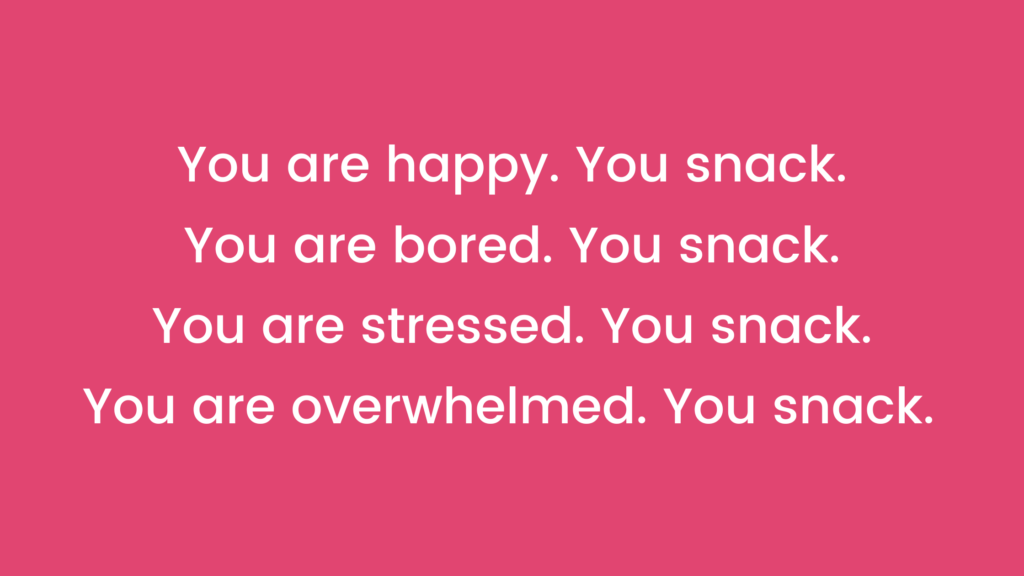
How to Curb Emotional Eating
We’ve all been there…The kids are fighting. You burned dinner in the oven again. School is canceled tomorrow for the umpteenth time this year. You got an angry email from your boss. And your husband will be home late for the third time this week.
Without even pausing to process everything that just happened and acknowledge how you feel in the moment, you run straight to the pantry and grab the Oreos in hopes of filling an emotional void and finding an ounce of happiness in this super stressful time.
Twenty minutes later, the Oreos are gone and it’s time to face the responsibilities that lie in front of you, but all you can feel is shame and guilt for the snack you just ate that did nothing but make you feel worse. You don’t understand why this is a recurring theme every single time you feel any type of emotion. You are happy. You snack. You are bored. You snack. You are stressed. You snack. You are overwhelmed. You snack. Why?!

We have many buckets in our lives: our families, friends, careers, creative outlets, joys, social lives, education, physical activity, finances, home & community environments, relationships, spirituality, connections, health, and many more.
The problem is that it’s really hard to find satisfaction within each of these areas of life, especially all at once. The buckets become imbalanced to the point where some areas of life are empty and others are overflowing. Maybe some fall in and out of being right where you want them. We look for ways to fill “up” our buckets, but sometimes the vices used to fill up these areas of life that are lacking end up physically filling us “out” instead. Filling out instead of up can leave us feeling more discouraged than ever.
So, how do we curb emotional eating?
- Practice sitting with your feelings & emotions instead of masking or running away from them. Acknowledge WHY you feel this way. What can you do about feeling this way? Tell yourself that you are OKAY. Preach that you are strong. Believe you can power through challenges and hardships.
- Work on transitioning the mind to understand that stress is usually not temporary, therefore, the activities typically paired with stressful moments are also not temporary. It’s 2022 and stress is all around us. There will always be something going on in this crazy world. Instead of thinking that, eventually, the stress will just go away and when it does so will the Oreos, start to believe that efforts are better focused on conditioning the nervous system to become more resilient to these stressors you experience and emotions you feel throughout the day. The more resilient you are, the less likely you will feel the need to run to the pantry.
- Remove yourself from the triggering or tempting environments. If your home office is in the kitchen and you tend to open the pantry every single time you get an annoying email you don’t want to deal with, remove yourself from the environment by going for a walk or moving your office to a safer part of the home. If you typically call your friend while grocery shopping and find yourself in the chip aisle after being triggered by the heaviness of the conversation, call her from the car on the way home instead. If you walk home from your 16-hour shift at the hospital only to pass by the candy shop, try taking a different route home.
Try this activity.
Take pen to paper and draw three columns.
Column 1
List the emotions that you feel throughout the day.
Column 2
Note which activities you typically pair with that emotion you are feeling. For example, when you are angry, you open a bottle of wine. When you are bored, you grab the pretzels.
Column 3
Re-evaluate. Is column number two truly helping to support the person you want to be? Or is there a different coping mechanism that would serve you better? For example, the next time you are angry, instead of pouring a glass of wine, try going for a walk instead. The next time you are bored, instead of mindlessly snacking on pretzels, try Facetiming your best friend instead! And be gentle with yourself. If Column Two calls for a snack and in Column Three you feel like a snack is the coping mechanism that truly nourishes and supports you in that moment, be okay with that! Do it in confidence and move on.
Unfortunately, there is no magic pill or easy answer for how to curb emotional eating. It takes work, self-discovery, and self-exploration, plus a little bit of experimentation. The best thing you can do is pause. Acknowledge the emotion in the moment and truly feel it, don’t run away from it. Ask yourself WHY you feel that way and if you can attack the emotion from a different angle. Find an activity that doesn’t just support how you want to feel in the moment but serves you long-term. Work on filling up that bucket with the things that truly make you feel good, instead of filling it out.
Want more healthy habit ideas? Grab my free guide – 5 Healthy Habits to Break to Lose Weight.

